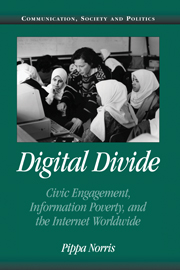Book contents
- Frontmatter
- Contents
- List of Tables
- List of Figures
- Preface
- PART I INTRODUCTORY FRAMEWORK
- PART II THE VIRTUAL POLITICAL SYSTEM
- 5 Theories of Digital Democracy
- 6 e-Governance
- 7 Online Parliaments
- 8 Virtual Parties
- 9 Civic Society
- PART III THE DEMOCRATIC DIVIDE
- Appendix A Nations in the Study and Abbreviated Names Used in Figures
- Notes
- Select Bibliography
- Index
5 - Theories of Digital Democracy
Published online by Cambridge University Press: 05 June 2012
- Frontmatter
- Contents
- List of Tables
- List of Figures
- Preface
- PART I INTRODUCTORY FRAMEWORK
- PART II THE VIRTUAL POLITICAL SYSTEM
- 5 Theories of Digital Democracy
- 6 e-Governance
- 7 Online Parliaments
- 8 Virtual Parties
- 9 Civic Society
- PART III THE DEMOCRATIC DIVIDE
- Appendix A Nations in the Study and Abbreviated Names Used in Figures
- Notes
- Select Bibliography
- Index
Summary
Previous chapters have examined the technological environment, including the worldwide distribution and social profile of users, concluding that at present the Internet has provided alternative channels of communication primarily for countries and groups already rich in informational resources. In this view the Internet, like cable TV, mobile phones, and fax machines before it, connects the connected more than the peripheral. The global reach, instantaneous speed, and limitless information available via the Internet has the potential to serve a far wider and more diverse community worldwide – providing a cornucopia of textbooks for Nigerian classrooms, a rich database of the latest medical research for Romanian hospitals, and a global shop window for Balinese art and Bangalore software – but widespread popular access requires reduced financial barriers. Initiatives to wire poorer communities through public libraries, schools, and community centers can aid diffusion, as can Internet cafés, and linkages via managerial, administrative, and professional elites. But the fact that telephones, radios, and televisions have not yet become standard items in poorer households around the world casts a skeptical light on the rosier scenarios projecting widespread connectivity for ordinary citizens in developing societies.
Building on this foundation, this section of the book starts to explore the virtual political system that is emerging, meaning the way that governments and civic societies are in the process of adapting to information technologies, and the structure of political opportunities this creates for active citizenship and civic engagement.
- Type
- Chapter
- Information
- Digital DivideCivic Engagement, Information Poverty, and the Internet Worldwide, pp. 95 - 111Publisher: Cambridge University PressPrint publication year: 2001



